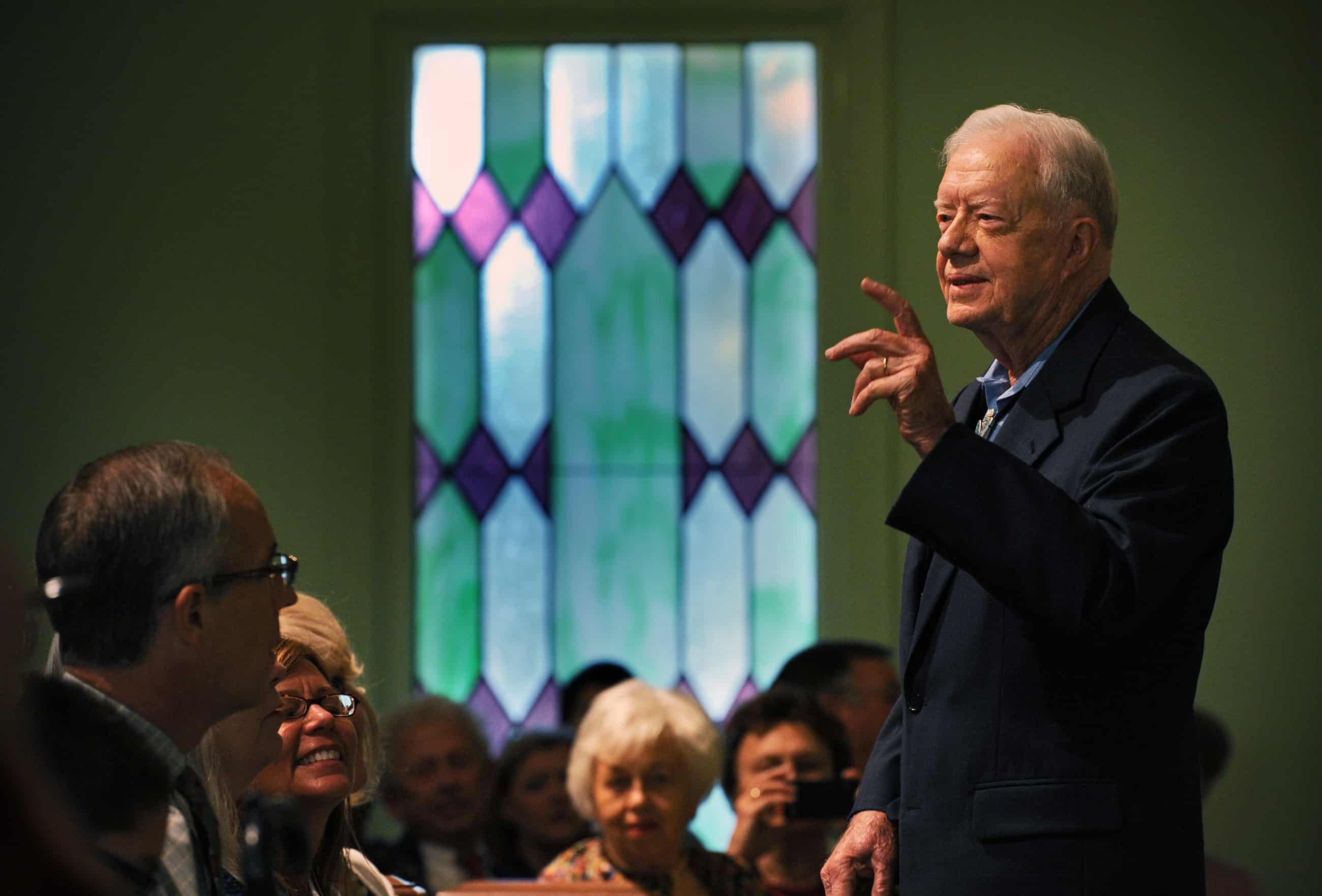Former U.S. President Jimmy Carter said that the cancer doctors discovered earlier this year, on his liver, has spread to his brain and that he will receive his first radiation treatment for the disease on Thursday afternoon.
“I’m perfectly at ease with whatever comes,” Carter said at a news conference at the Carter Center in Atlanta.
Carter, 90, said that doctors found “four spots of melanoma on my brain — small spots” after first discovering cancer during an Aug. 3 operation to remove a tumor from his liver.
During that surgery, Carter said, doctors suspected that the cancer had originated in other parts of his body. They later discovered the melanoma spots, about “two millimeters” in size, on his brain.
Doctors removed about one-tenth of his liver during the surgery, which he said healed quickly and left him with “minimal pain.”
He will undergo four courses of radiation to treat the cancer in his brain.
Carter said doctors will continue to scan his body for cancer, in an effort to determine where the melanoma originated.
According to Memorial Sloan Kettering Cancer Center, “one of the most common primary tumors to spread to the brain is malignant melanoma. In nearly 50 percent of people with melanoma that has metastasized, the disease can be found in the brain.”
The center added that “the outlook for patients with brain metastases generally depends on the number, size, location, and origin of the primary tumor or tumors.”
In May, during a trip to Guyana to monitor elections there, Carter fell ill with a “very bad cold” and returned to Atlanta early. Doctors performed a complete physical examination and found the tumor on his liver.
By the end of June, doctors were certain that he would need to have an operation on his liver. But Carter delayed surgery in order to complete his book tour for his memoir published this year, “A Full Life: Reflections at Ninety.”
“The doctors told me that it was a very slow growing cancer, apparently it wouldn’t make any difference between the middle of July and August, so we scheduled it when I got through with the book tour,” Carter said.
Carter said that an MRI scan the afternoon after the cancerous mass was removed from his liver revealed that melanoma had already spread to his brain.
“I just thought I had a few weeks left,” he said during the news conference. “But I was surprisingly at ease — much more so than my wife was.”
President Carter, his family, and the @CarterCenter are all in our thoughts and prayers. #JimmyCarter pic.twitter.com/dTIndKTEWD
— Emory University (@EmoryUniversity) August 20, 2015
The former president will be treated at the Winship Cancer Institute, about two miles from the Carter Center. Both the institute and Carter’s organization are affiliated with Emory University.
Carter is the second-oldest living president, separated by just over 100 days in age from George H.W. Bush. Carter, the 39th president, served in the White House from 1977 to 1981.
Since his presidency he has continued his humanitarian and human rights work through the Carter Center. It was for that work that he was awarded a Nobel Peace prize in 2000.
For now, he noted that his cancer treatment will become his “top priority.”
“The Carter Center is well prepared to continue on without any handicap,” Carter noted.
Several members of Carter’s immediate family — his brother, two sisters, his mother and father — have all died from cancer.
Beyond his international travel schedule, Carter and his wife of 69 years, Rosalynn, have maintained a life in Plains, Georgia, his hometown. He noted that he doesn’t expect cancer treatment to halt his usual contributions to his place of worship, Maranatha Baptist Church.
“I plan to teach Sunday school this Sunday — and every Sunday as long as I’m physically and mentally able,” Carter said.
He noted that the well wishes have poured in from President Barack Obama and the first family, as well as former presidents Bill Clinton, George H.W. Bush and George W. Bush.
Former Secretary of State Hillary Clinton and current Secretary of State John Kerry have also called to wish him well.
“It’s the first time they’ve called me in a long time,” Carter joked.
Carter spoke to a full room of journalists, reflecting on — and occasionally joking about — his legacy in the White House and as a global humanitarian.
He called his work with the Carter Center “personally more gratifying” than his presidency, though he joked that he wished he might have been able to serve a second term and then engage in humanitarian work after leaving the White House.
“I think I have been as blessed as any human being in the world,” Carter said. “So I’m thankful and hopeful.”
© 2015, The Washington Post






